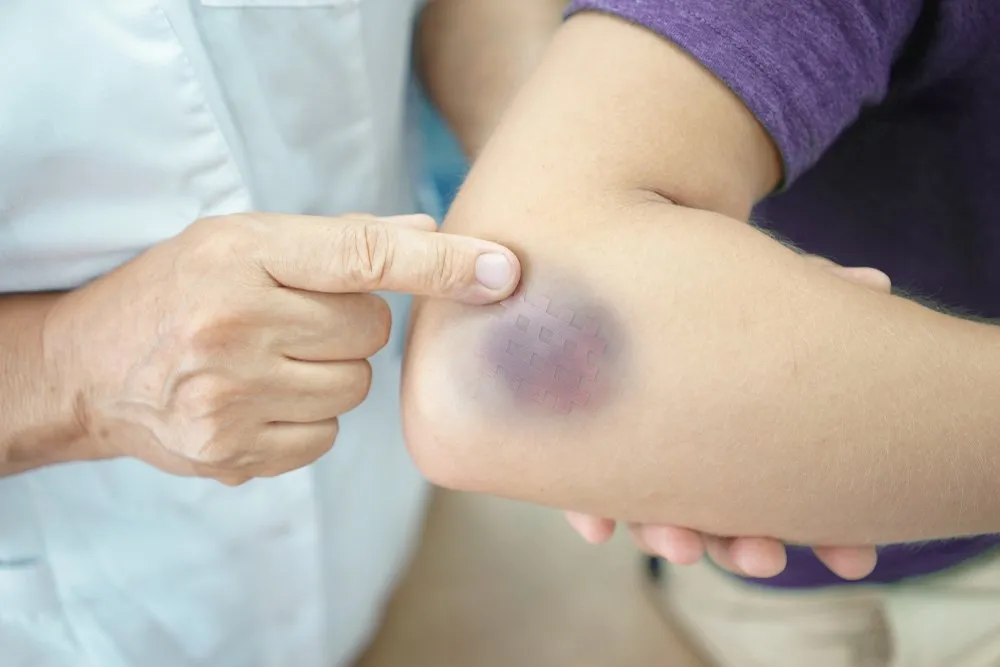Bruises are a part of life. Whether you’ve bumped into a coffee table or taken a spill during a game of basketball, most of us have experienced the familiar blue or purple marks on our skin. But have you ever wondered why some people seem to bruise more easily than others? Some people notice bruises on their skin with little to no memory of what caused them. If you’re someone who constantly finds new bruises without any clear explanation, you’re not alone—and there could be various reasons behind this phenomenon.
What Causes Bruises?

Bruises, also known as contusions, happen when small blood vessels under the skin break due to an impact. When these vessels burst, blood leaks out and settles under the skin, forming the characteristic discoloration. Most bruises begin as dark purplish spots that eventually fade into blue, yellow, or green as the body reabsorbs the blood over time.
While bruises are often the result of minor injuries like a bump or fall, they can also happen spontaneously due to various internal factors. The primary causes of bruising include:
- Minor trauma: A bump or fall that damages small blood vessels.
- Vitamin deficiencies: Lack of vitamins such as Vitamin K, B12, or C can weaken blood vessels and make you more susceptible to bruising.
- Medications: Certain blood thinners or nonsteroidal anti-inflammatory drugs (NSAIDs) like ibuprofen can increase your tendency to bruise.
- Medical conditions: Disorders like hemophilia, von Willebrand disease, or cirrhosis affect the blood’s ability to clot, increasing the risk of bruising.
Understanding the Role of Vitamin Deficiencies
One of the most common reasons some people bruise more easily is due to vitamin deficiencies. Vitamins play a crucial role in maintaining healthy skin and blood vessels, as well as supporting proper blood clotting. If you’re lacking in specific vitamins, your body might have a harder time repairing damaged blood vessels, leading to easier bruising.
Vitamin K Deficiency
Vitamin K is essential for blood clotting. Without enough Vitamin K, your body struggles to stop bleeding after an injury, causing more blood to pool under the skin and form bruises. You can find Vitamin K in leafy greens like kale, spinach, and broccoli.
Vitamin C Deficiency
Vitamin C helps strengthen the blood vessels and tissues in the body. A deficiency in Vitamin C can cause fragile blood vessels, making you more prone to bruising. Citrus fruits, strawberries, and bell peppers are all rich sources of Vitamin C.
Zinc Deficiency
Zinc plays a role in the healing process. If you have low zinc levels, your body may take longer to heal bruises and other injuries. You can increase your zinc intake through foods like pumpkin seeds, spinach, and legumes.
Medical Conditions and Bruising
In some cases, bruising easily can be a sign of an underlying medical condition. It’s important to recognize when bruising might be a symptom of something more serious. Here are some medical conditions that can cause frequent bruising:
Hemophilia
Hemophilia is a genetic disorder that affects the blood’s ability to clot. People with hemophilia are prone to excessive bleeding, which can lead to frequent and unexplained bruises, even after minor injuries.
Von Willebrand Disease

Similar to hemophilia, von Willebrand disease is another blood-clotting disorder that makes it difficult for the body to stop bleeding. People with this condition often experience frequent bruising, nosebleeds, and excessive bleeding from cuts.
Cirrhosis
Cirrhosis, a condition characterized by liver damage, can affect the production of clotting factors in the blood. This can lead to increased bruising, especially in people with advanced liver disease.
Leukemia and Lymphoma
Both leukemia and lymphoma, types of blood cancer, can lower platelet counts. Platelets help blood to clot, and a low platelet count can lead to spontaneous bruising, even without noticeable injury.
Age and Its Impact on Bruising
As we age, our skin changes, and so does our tendency to bruise. Older individuals often notice they bruise more easily, and this is due to several factors.
Thinner Skin
As you age, your skin becomes thinner and loses some of its protective layers. This thinning makes it easier for blood vessels under the skin to get damaged.
Weaker Blood Vessels
Blood vessels also become more fragile with age. The loss of collagen, which provides structure to the skin and blood vessels, makes it easier for older adults to bruise after even minor injuries.
Gender and Genetics: Do They Play a Role?

Yes, both gender and genetics can play a role in how easily you bruise. Studies have shown that women tend to bruise more easily than men. One reason for this is that women generally have thinner skin and less muscle mass, both of which can make bruising more apparent.
Additionally, men have thicker skin than women due to the presence of more collagen, especially before menopause. After menopause, women lose a significant amount of collagen, making them even more prone to bruising.
Genetics also play a part. If your parents or grandparents bruised easily, you might be more prone to it as well. Some families have more delicate blood vessels, making them susceptible to bruising from even minor bumps or scrapes.
Medications and Their Effects on Bruising
Certain medications can make you more likely to bruise. If you’re taking blood thinners, for example, your blood doesn’t clot as efficiently, which means even minor injuries can result in significant bruising. NSAIDs like aspirin and ibuprofen can also have a blood-thinning effect, increasing your likelihood of bruising.
If you notice a sudden increase in bruising after starting a new medication, it’s worth discussing with your doctor to determine if your medication might be a contributing factor.
Preventing and Treating Bruises
While it’s impossible to avoid every bump and bruise, there are ways to strengthen your skin and blood vessels to reduce your chances of bruising.
Dietary Changes for Stronger Blood Vessels

To prevent easy bruising, consider incorporating these nutrient-rich foods into your diet:
- Leafy greens: Rich in Vitamin K, which helps blood clot more effectively.
- Citrus fruits: Packed with Vitamin C, which strengthens blood vessels.
- Berries: Contain flavonoids like quercetin, which help reduce inflammation and protect blood vessels.
- Zinc-rich foods: Zinc plays a role in tissue repair, and foods like seafood, legumes, and seeds are excellent sources.
Ice Therapy
Applying ice immediately after an injury can help reduce the size and severity of a bruise. The cold temperature constricts blood vessels, limiting the amount of blood that leaks into surrounding tissues. Be sure to wrap the ice in a cloth to avoid direct contact with the skin and limit the application to 10-15 minutes at a time.
Compression
Using an elastic bandage to wrap the injured area can also help reduce swelling and prevent the bruise from spreading. Just be careful not to wrap it too tightly, as this can cut off circulation.
Heat Therapy
After 48 hours, applying a warm compress can help increase blood flow to the bruised area and speed up the healing process. A warm compress dilates blood vessels, allowing trapped blood to be reabsorbed more quickly.
Natural Remedies to Heal Bruises Faster

Several natural remedies can help speed up the healing of bruises and reduce discomfort.
Arnica Cream
Arnica is a popular herbal remedy used to reduce inflammation and heal bruises. Applying arnica cream to a fresh bruise can help reduce swelling and promote faster healing.
Aloe Vera
Aloe vera has soothing properties that can help reduce inflammation and hydrate the skin. Applying aloe vera gel to the bruised area can help with discomfort and improve the healing process.
Bromelain
Found in pineapple, bromelain is a group of enzymes that help reduce inflammation and encourage the reabsorption of blood from bruises. Consuming pineapple or taking bromelain supplements can help bruises heal faster.

Bruising easily can be caused by a wide range of factors, from simple vitamin deficiencies to more serious medical conditions. Age, gender, genetics, and even your medications can all play a role in how often you find bruises on your skin. While some causes of bruising are harmless, others may indicate a need for medical attention.
If you’re concerned about frequent bruising or notice bruises appearing without any clear reason, it’s always a good idea to consult with a healthcare professional. In the meantime, ensuring a diet rich in essential vitamins and minerals, using ice and heat therapies when necessary, and being mindful of medications can help you manage and reduce the appearance of bruises. Remember, prevention and proper care go a long way in maintaining healthy, bruise-free skin.


